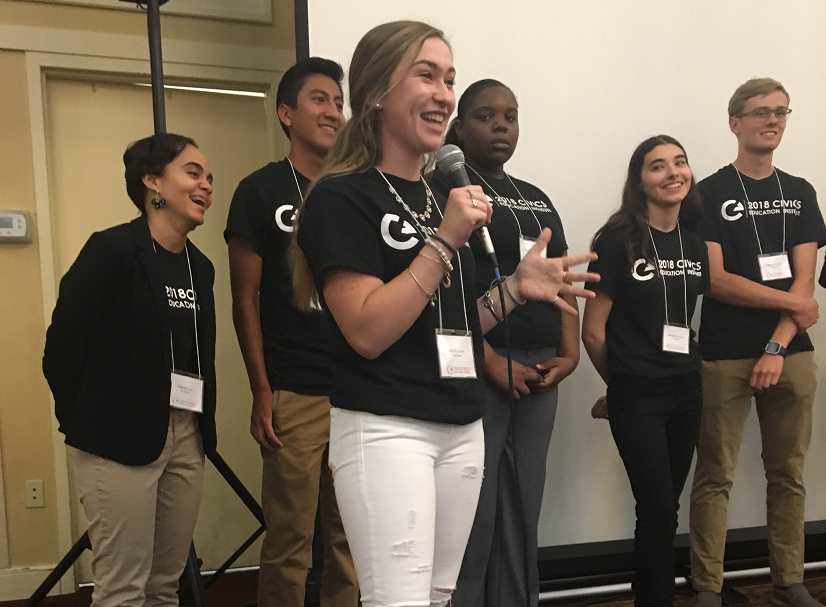In 2020-2021, school districts across Massachusetts will fully implement student-led civic engagement projects in every 8th grade and every high school. Projects will occur as class assignments, but students may request the option to complete individual projects. Later in November, the Department of Elementary and Secondary Education (DESE) expects to announce a small grants program to support implementation.
Massachusetts states that, “Civics learning is the acquisition of knowledge, the intellectual skills, and the applied competencies that citizens need for informed and effective participation in civics and democratic life. A non-partisan, student-led civics project is based on action civics–a process of applying civic knowledge, skills, and dispositions to mobilize change leading to systems impact.”
It’s a tall order. Teaching the “knowledge, skills, and dispositions” of civic life requires new teaching skills as well as new curriculum and new school structures. Additionally, success will require an elevated role for the teacher. As long-time civics projects teachers say, “In order to teach civic engagement, I myself have to be civically engaged.”
Many districts, especially in Eastern Massachusetts, have joined the networks of Generation Citizen, or Project Citizen of the Center for Civic Education (best known for its We the People curriculum). Many local organizations are stepping up to support this reordering of k-12 education with materials and professional development. Emerging America too will offer face-to-face professional development in Northampton in January-February, led by long-time national leader in service-learning and civic engagement, Rich Cairn. Regardless of the vehicle, all teachers and districts will need to learn the “Six Stages of Civics Projects,” adopted by DESE. Projects must not only be student-led, they must also include development of civics knowledge and skills, exploration of real community needs and assets, and analysis of systemic problems.
Opportunities for ALL Learners
Building on our work with the Accessing Inquiry project, Emerging America expects also to again take the lead in building understanding and resources to mobilize ALL learners in civic engagement. How will schools ensure that students with disabilities, in particular, have equitable opportunities to learn about and to impact their communities? We are counting on our networks of innovators–the many classroom teacher-leaders who brought inquiry to the forefront of learning–to again step up to generate solutions together. We are eager to begin. Watch the History eNews for further announcements in coming weeks and months.
Civics Website
CIRCLE and the Jonathan M. Tisch College of Civic Life at Tufts University launched the Massachusetts K-12 Civics and Social Studies Resources website. https://k12civics.tufts.edu/. Co-sponsored by the advocacy group, the Massachusetts Civic Learning Coalition, the new site builds on and replaces Emerging America's 2018 Civic Education site created in tandem with DESE and the 2018 Civic Education Institute.
Mass DESE Resources
Following on the civics focus in 2018 History and Social Science Framework and major 2018 Civic Engagement legislation (S.2631), the Massachusetts Department of Elementary and Secondary Education put in place several resources to support implementation. In 2019, the Massachusetts Legislature appropriated funds to support implementation of projects.
- Current Frameworks page includes final 2018 History & Social Science Curriculum Framework.
- Mass DESE “Civics Project Guidebook” - Civics Guidance - Download PDF. 40-page Key document for Massachusetts civic engagement projects. (Sign up for the Emerging America course on planning civic engagement projects will. Info & Registration.) Written in collaboration with Generation Citizen and the Democratic Knowledge Project at Harvard, the guide presents six stages of civic engagement projects.
- DESE is offering a Civics Project Network. Launched in October, the network will convene K-12 leaders again in November, February, and May to support planning and implementation of grade 8 and high school civics projects.
- DESE will again hold a civic engagement conference in late spring.
- DESE is developing model curriculum units for civics.
- DESE hired Cecelia Spencer, History and Social Science Content Specialist, whose work includes leadership for civic engagement.
MCAS
DESE reports that it is holding a proof-of-concept limited pilot of a new MCAS 8th grade test in fall 2019. Work will continue on item development in early 2020, with an expanded pilot in the 2020-2021 school year. Field testing and professional development around the new test would take place in 2021-2022. The earliest potential operational assessment would take place in 2022-2023. The test will feature performance task sets, including local administration of formative tests and end-of-year state administered and scored summative tests. The new test is intended to include analysis of a set of primary and secondary sources and will likely include computer-based interactive features. DESE is reviewing Maryland and New York experience with evidence-based sets of sources. Plans still require formal adoption by the Massachusetts Board of Education.




